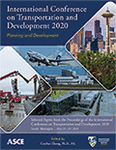International Conference on Transportation and Development 2020
A Customizable Metric to Provide a Comprehensive Picture of the Mobility Potential of a Location
Publication: International Conference on Transportation and Development 2020
ABSTRACT
Accessibility in a geo-spatial context refers to the ease of reaching a variety of opportunities from a given location. Accessibility theories (and resulting metrics) have traditionally focused on quantifying access to specific opportunities (such as jobs), or focused on specific modes (such as car, bike, etc.). Such approaches often fall short of providing a comprehensive picture of the true accessibility potential of a location as a combination of multiple modes to multiple types of destinations. Addressing this drawback, a novel metric labeled the ‘Mobility Energy Productivity (MEP) Metric’ was developed at the National Renewable Energy Laboratory to quantify the mobility potential of a location to connect people to goods, services, and employment using a variety of modes, while accounting for time, energy, and affordability. The MEP metric has been integrated with advance travel behavior models to compute the changes in mobility potential for various future scenarios, such as introduction of automated vehicles, and/or electric vehicles—but does so at the aggregate, or average-citizen level. The MEP in its initial iteration is not customized to the particular socio-economic contingents, or even to an individual whose modal availability or pattern of trip making may substantially differ from the average. Addressing this gap, this research effort extends the MEP framework from a static state to a more tailored and dynamic state, one in which an individual, or group can customize the metric for their unique characteristics, such as modes, activity patterns, and time-of-day preferences. The extended MEP metric framework can now be integrated to assess the customized mobility energy productivity of an individual.
Get full access to this article
View all available purchase options and get full access to this chapter.
REFERENCES
Hou, Y., Garikapati, V., Nag, A., Young, S. E. and Grushka, T. (2019) Novel and Practical Method to Quantify the Quality of Mobility: Mobility Energy Productivity Metric. Transportation Research Record. https://doi.org/10.1177/0361198119848705.
North American Bike Share Association (NABSA). (2019) Documentation for the General Bikeshare Feed Specification, a standardized data feed for bike share system availability. Accessed November 22, 2019. https://github.com/NABSA/gbfs.
National Household Travel Survey (NHTS), (2017), https://nhts.ornl.gov/.
Davis, S. C. and Boundy, R. G., Transportation Energy Data Book, Edition 37.2, (2019) Oak Ridge National Laboratory, https://cta.ornl.gov/data/index.shtml.
Information & Authors
Information
Published In
International Conference on Transportation and Development 2020
Pages: 251 - 261
Editor: Guohui Zhang, Ph.D., University of Hawaii
ISBN (Online): 978-0-7844-8316-9
Copyright
© 2020 American Society of Civil Engineers.
History
Published online: Aug 31, 2020
Published in print: Aug 31, 2020
Authors
Metrics & Citations
Metrics
Citations
Download citation
If you have the appropriate software installed, you can download article citation data to the citation manager of your choice. Simply select your manager software from the list below and click Download.
